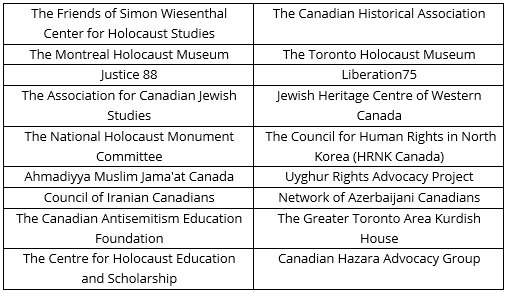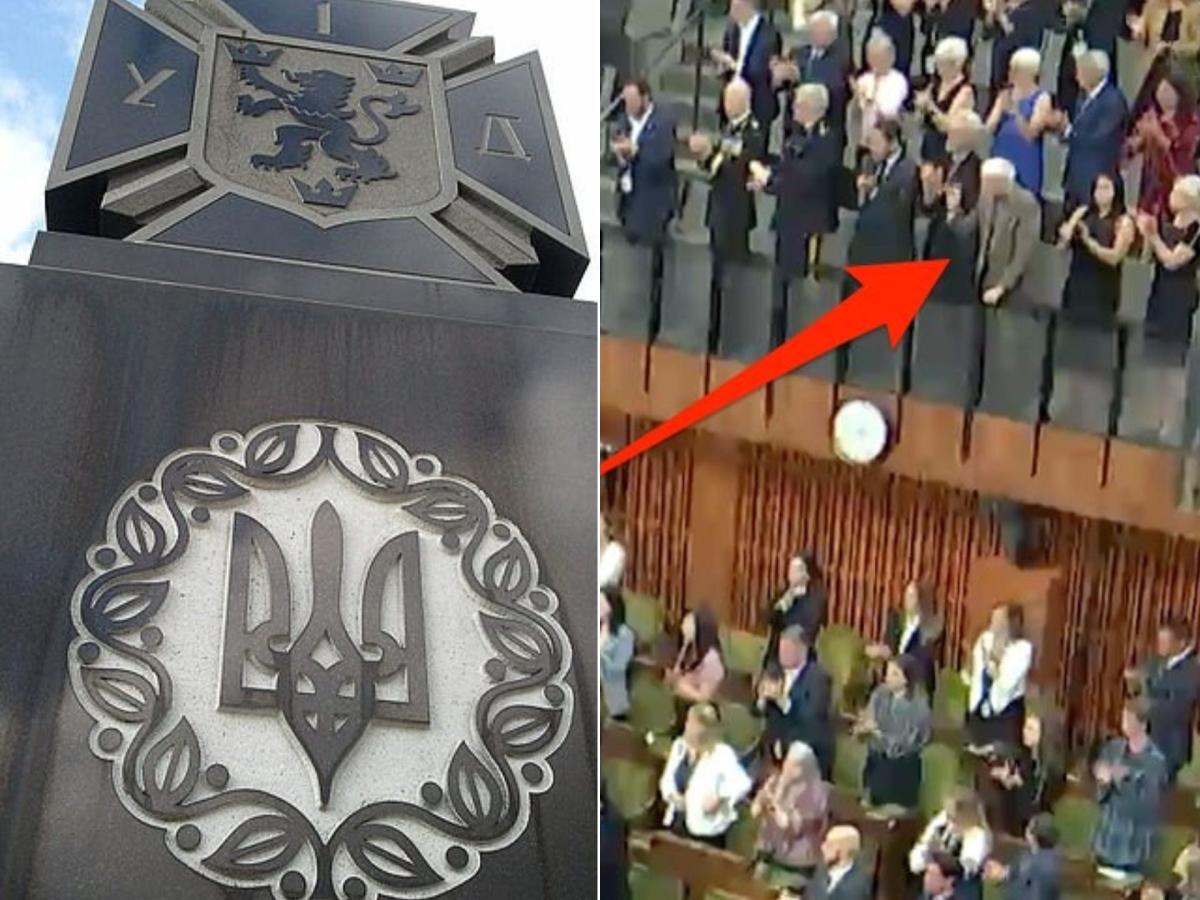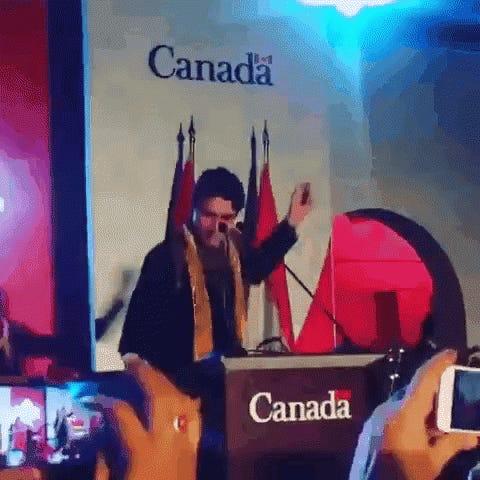Whatever else might be said about the continuing catastrophe of Trudeau’s Modi-Killed-A-Canadian exercise in changing the “foreign interference” channel from the benefits the Liberals accrued from Beijing’s election monkeywrenching in 2019 and 2021 (I’ll have some more backstory to the latest “news” about all that in a later newsletter), here’s something you should notice.
Under the biggest headlines, all these days after Trudeau fashioned himself into the heroic centre of world attention, everything you’ll find still relies on asserted “facts” that remain uncorroborated and sourced solely to Trudeau and to the friends and relatives of the slain Hardeep Singh Nijjar. In other words, to the Khalistanis in Canada that the Government of India has listed as terrorists. And of course, now, the New Democrats’ Jagmeet Singh,
who would say that, wouldn’t he.
I can’t find anything that has moved the needle from the direction it was pointing in when I put together last weekend’s Real Story Special,
The worst of all possible worlds, or from that Real Story series I assembled in the days and weeks following Nijjar’s gangland-style murder in the parking lot of the Guru Nanak Temple on June 14.
Maybe “Indian agents” really
were involved. Maybe Nijjar was just another casualty in Metro Vancouver’s interminable gang wars. Maybe that’s a distinction without a difference.
It never ends
I don’t mean to fault Trudeau alone for this pattern. It’s clearly a feature of what Canada has become, and it only occasionally erupts in embarassments noticed by the outside world. Like last year, when Foreign Affairs Minister Mélanie Joly’s deputy chief of protocol popped round to the Kremlin’s Ottawa embassy to take in
the “Russia Day” party, with vodka and caviar, forgetting, it appeared, that we’re actually not on Russia’s side in this whole Ukraine thing.
Already the outlier in the Five Eyes intelligence partnership, Canada is excluded from the U.S-Australia-United Kingdom Pacific defence pact. Canada is the weakling of a “concerned” NATO alliance owing to
Trudeau’s backchannel insistence that Canada will never meet NATO’s two-per-cent GDP military spending floor. NORAD is worried about us. Turkey is “disappointed” with us. Even Haiti is “frustrated” by us.
And now this, just from Friday: After Trudeau denied suggesting that Canada’s defence spending would never be brought up to NATO’s two-per-cent GDP threshold, Canada’s top soldier says he’s being forced to find
nearly $1 billion in “savings” that will unavoidably reduce the Armed Forces' already-stretched capabilities.
Chief of defence staff General Wayne Eyre: "I had a very difficult session this afternoon with the commanders of the various services as we attempt to explain this to our people," Eyre said.
And then Defence Minister Bill Blair's office issued a statement saying that really, the cuts aren’t
cuts. There’s that optics thing again.
Back to the circus and the main show
Without inviting subscribers to get their hate on with Canada’s “MSM,” I have to say something out loud: The Parliamentary press gallery should share some of the profoundly shy-making discomfort that MPs from every party have been made to endure by becoming objects of worldwide ridicule owing to the Yom Kippur Eve incident.
I’ll have some sensitive stuff on the other side of the paywall about all that.
We’ve been lurched right back into the “Chrystia Freeland Lied About Her Nazi Past” fiction that was mainlined into the Canadian news media directly from Russia’s embassy in Ottawa on January 11, 2017. And yes, it was and remains a propaganda fiction.
The years pass, and things change, but things also stay the same.
Unfortunately, we’ve all spent a great deal of effort being clever in our elucidations upon how to properly distinguish between a Ukrainian patriot and a Nazi collaborator in the terror time of the 1940s, and about where one might situate the boundaries of Soviet-occupied Eastern Galicia on contemporary maps of the Polish-Ukrainian borderlands, and other such boring ephemera.
This is what Moscow wanted. . .
No, that’s not something I wrote about what’s happening right now. It’s from six years ago, from my deep dive for Maclean’s magazine into the attack on Freeland that was put in play by Moscow’s diplomats in Ottawa, and by their useful Canadians idiots among certain “conservative” groupings and not a few “progressives,” as well as some journalists.
Worse, and even more crazy, Canada is being dragged even further back, to a Soviet-era dezinformatsiya operation aimed at pitting Jews and diaspora Ukrainians against one another. It was called Operation Payback. I’ll be on about its implications, and the sensitivities attending to it, for paying subscribers below.
For all subscribers: full marks go to Lev Golinkin of the Jewish newsmagazine
The Forward, in New York. It was Golinkin who
broke the story about The Nazi In The Visitors’ Gallery.
Golinkin’s story was nothing like the usual Kremlinoid junk about Nazi puppetmasters running Ukraine and Nazis in high Canadian places. True, Golinkin is
a controversial figure in Jewish intellectual circles in that his Nazi-hunting commitments are said to arise from an internalized pathology in a way “that does not help anyone except the producers of Russian propaganda.”
I wouldn’t know. Golinkin is himself a Ukrainian refugee who insists that 99 percent of Ukrainians are nothing like the Nazi diehards you’ll hear about in Russian government press releases, tankie webzines, paleoconservative People’s Party chatrooms and pseudoleft “anti-war” polemics.
Okay, full disclosure, here are my own biases
Yes, I have my own biases here. My own affiliation with the Raoul Wallenberg Centre for Human Rights hasn’t been an encumbrance, and neither has my affinity with the Centre for Israel and Jewish Affairs. But I do worry about the implications for my relationship with certain other leading voices in Jewish advocacy because of the difficult subject addressed in what follows.
When I launched this newsletter in February of last year I made it plain that the project was my response to a crippling epistemic incoherence throughout the Anglosphere that had enfeebled journalism in a terrible way, along with a declining capacity to discern knowlege from belief, fact from fiction and news from propaganda. See:
Liftoff. So that’s “where Im coming from” here.
Only a few weeks later, in the matter of Russia’s barbaric imperialist war of conquest in Ukraine, I wrote this:
Let's not be idiots this time, okay? Solidarity, unity and morale are important. Hearts and minds matter. Ukraine matters. I fear I might have been too optimistic, but that’s my standpoint still.
For all my acerbic treatment of the Trudeau government, I’m routinely badgered along these lines: Why are you always defending Chystia Freeland? I’m not, but I do have a history of championing Freeland’s interventions: She saw to the ouster of that Chinese Communist Party sycophant John McCallum, Canada’s ambassador to China, and she forced the ouster of Sergei Lavrov’s friend Stephane Dion, her Eurodweeb predecessor as Canada’s foreign affairs minister.
Also, she came to politics as a journalist and a partisan in the global struggle for liberal democracy. and she has championed one or two of my own interventions. Like the case of Waseem Ramli,
a Montreal man-about-town and Liberal Party benefactor with ties to Trudeau and to cabinet minister Marc Miller - and to Syrian mass murderer Bashar Assad.
Unbeknownst to Freeland, her own foreign afffairs bureaucrats had bestowed Ramli with top credentials as Syria’s consul-general in Montreal. This was a guy best known for showing up at Syrian refugee rallies in a scary-looking bright red Humvee with 1SYRIA custom licence plates, a rear window emblazoned with Baathist iconography and a side window obscured by a huge picture of Assad’s face. After I broke the story Freeland pulled his credentials right away.
Miller has never forgiven me for it.
Also a bias: I’m among roughly 300 Canadians sanctioned by Russia, forbidden from visiting the country ever again. So is Freeland. She was one of the first Canadians to earn that honour.
And here’s where things get really touchy.
Do take out a paying sub to get over this wall. You won’t regret it. I’d prefer you choose the annual option, thanks. Less than you spend on coffee at either Tim Horton’s or Starbucks. Right
here.
Dezinformatsiya, by mistake & on purpose
The “monumental, unprecedented” embarrassment Golinkin’s story caused would have been a brilliant Larry David script for Curb Your Enthusiasm:
What! Their entire government gave a standing ovation to a Nazi?! I thought Canadians were supposed to be nice! Except it’s not funny, because the joke played out in the real world, in headlines right around the planet.
And while it was happening, in real time, it doesn’t seem to have occurred to anyone in the Parliamentary press gallery to just stop for a second and think:
‘Hey, wait. House Speaker Anthony Rota just singled out a Ukrainian “hero” in the visitors’ gallery who was fighting the Russians sometime between 1941 and 1945. But. . . wasn’t Russia on our side against the Nazis back then?’
Not to get too nitpicky about historical context and nuance and all that, but we were on the same side as the Russians back then, and the Allies expended enormous propaganda effort during those days to convince everyone that Josef Stalin was one of the good guys. That’s whose side
we were on.
Even so, if you know anything about the Holocaust, you’ll know why we don’t adversely judge our “allyship” with Stalin between 1941 and 1945. But now you’ll want to think about the suddenly infamous old man Yaroslav Hunka, who was a child when the genocidal Russians were killing between 3.5 million and 10 million of his people in Ukraine.
If you know anything about the Holdomor, you might not want to get too judgy about the moral choice the teenaged Hunka made to enlist with German forces he himself called “the new enemy,” in order to keep the old Russian enemy at bay.
There is no evidence that Hunka was some kind of bloodthirsty Jew killer, by the way, and because he was a Slav he would never have been permitted to join the pure “Aryan” Nazi Party anyway.
But this much is unambiguous: the First Ukrainian Division that Hunka volunteered to serve was commanded directly by the Nazis. The division was otherwise known as the Waffen-SS Galicia Division, also the SS 14th Waffen Division, because that’s what it was - a division of the Nazi Party’ savage military wing.
And that particular SS division committed unspeakable atrocities in its service of the Third Reich in Ukraine, Poland, Slovakia and elsewhere. In Ukraine, President Zelenskyy himself has gone out of his way to oppose commemorations of that same Galician Waffen SS division.
There are deep wounds that this whole thing has opened. Irwin Cotler, the former Canadian justice minister who is my lodestar at the Raoul Wallenberg Centre, pointed out that back in the late 1940s Galician SS veterans had an easier time of it getting into Canada than Jews did.
But there are also deep propaganda currents at work here, and you don’t make a lot of friends when you try to drill down into them. So I’ll start with some low-hanging fruit.
“False Flag” stupidity, and a problem in the newsroom
A couple of days after the House of Commons’ Mistake From Hell story broke, I was alerted to a vaguely familiar name showing up in respectable news media as an authority on Ukraine. Over the past week alone, University of Ottawa professor Ivan Katchanovski has appeared in the Ottawa Citizen, the Canadian Press and the
Globe and Mail.
Oh, that guy, it suddenly occured to me.
This is the same Ivan Katchanovski who shows up on Moscow’s RT News, and Tehran’s Press TV and “Truthout” and other such swamps of disinformation. He’s best known for his concoction of the popular Putinist conspiracy theory that the Euromaidan protesters massacred by Kremlin puppet Viktor Yanukovych in 2014 were killed by far-right elements among the protesters themselves.
It was a “false flag” operation designed to kick off the “Revolution of Dignity” that led to the overthrow of Yanukovich, the thing that had so enraged Putin. My friend Cathy Young has done tremendous work unraveling this nonsense, in this exploration published in The Bulwark back in March.
…
Who are you calling a Nazi?
I also highly, highly recommend freelancer Justin Ling’s substack newsletter from Tuesday:
About the SS Officer in the Gallery: History is messy, horrible, complicated. All we can do is face it.
Apart from saving me a lot of effort and Real Story worldlength, Justin has done an amazing job of digging into Russian disinformation efforts in Canada. Takeaway line: “While there are occasions where crying ‘Nazi!’ should be the beginning and ending of the conversation, this isn’t one of them. So, rather than just weaponizing history, let’s try to unravel the past from the present.”
Lots of great spy-versus-spy stuff in there, too.
The SS Officer in the gallery story should not be expected to go away, anytime soon. There’s much about the past and the present that might soon unravel altogether.
On Friday, I heard from the Jewish advocacy organization B’nai Brith. They’ve now joined forces with an impressive array of civil-society and diaspora groups in calling for action on a proposal they put to the Standing Committee on Access to Information back in February. They want full public disclosure of federal records on Nazi war criminals who found their way to Canada, and they want the establishment of a public archive of Canada’s Holocaust records, too.
Here’s who’s backing the move.

This is serious business. Separately, Shimon Koffer Fogel of the Centre for Jewish and Israel Affairs says that the Hunka incident in the House suggests that Canada’s War Crimes Program should “review and consider any new evidence that has come to light from the release of archival material that further implicates those who committed wartime atrocities who are living in Canada.”
There’s a measured, wise standpoint. But if the B’nai Brith coalition succeeds - and fair play to them - the effort could threaten to upset the bonds that bind Jewish Canadians and Ukrainian Canadians. If Canada weren’t such an unserious country nowadays, that might not be something to worry about happening.
But what’s on the table now is effectively a relitigation of the Deschênes Commission of the 1980s, which was supposed to settle questions about Nazis in our midst. One shudders to think how much hay Russia would successfully make of that.
Operation Payback
To get deep down into the unsettling questions at hand, subscribers would want to read Herbert Romerstein’s expansive analysis,
Divide and Conquer: The KGB disinformation campaign against Ukrainians and Jews.
It would be far too simplistic to suggest that the anxieties and agitiations that led to the Deschênes Commission were a function of Soviet-era “active measures” pitting Jews and Ukrainians against one another.
But Moscow did expend an astonishing degree of resources to inflame those tensions and feed those anxieties, and the KGB was happy with the payoff.
Just pointing this out can be like stepping into a minefield. The National Post was drawn into the arguments earlier this year for publishing
an excerpt of a book by the Royal Canadian Military College professor Lubomyr Luciuk, co-authored by Volodymyr Viatrovych, titled
Enemy Archives: Soviet Counterinsurgency Operations and the Ukrainian Nationalist Movement: Selections from the Secret Police Archives.
The KGB’s main target in Canada: The Galician SS division that Yaroslav Hunka joined as a teenager.
The Friends of Simon Wiesenthal Centre was not happy with the National Post. FSWC Director of Allyship and Community Engagement Daniel Panneton: “Democracies of the world have stood with Ukraine in the face of Russian President Vladimir Putin's unprovoked and aggressive war, but solidarity cannot tolerate Holocaust distortion and the glorification of Nazi collaborators.”
My friend Sean Maloney, also a history professor at the RCMC, wrote
an extensive review of
Enemy Archives, and here’s a couple of his conclusions. The KGB’s Operation Payback was strangely successful. And it’s especially threatening now, in light of Moscow’s insistence that its war crimes in Ukraine are all in aid of a “de-Nazification” of the country. “This is exactly what the Russia of Vladimir Putin is doing today vis-à-vis Ukraine. Indeed, resurrecting this Cold War-era controversy and attacking scholars that examine it even serves Russian objectives today.”
The Deschênes Commission, and the RCMP, spent a good deal of effort looking into the role the Galician SS played in the war. Both investigations found that its members had been properly screened before their admission to Canada, and that there was no evidence implicating them in war crimes.
That doesn’t mean that Canada’s Jewish advocacy organizations don’t have a point about releasing all the commission’s redacted files and establishing a publicly-accessible repository of Holocaust archives.
But like I said, in one of the first newsletters in the Real Story archive: Solidarity, unity and morale are important. Hearts and minds matter.
Ukraine matters.






